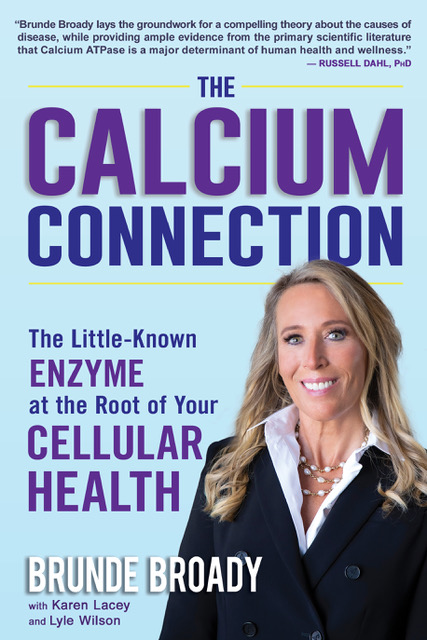In her newly released book, Brunde Broady shares the little-known connection between our health and the enzyme Calcium ATPase.
Brunde Broady—the mother, researcher, and author of the newly released book, The Calcium Connection: The Little-Known Enzyme at the Root of Your Cellular Health—earned her MBA from Yale and went on to become a financial analyst and private investor—but her life took a turn when her son, Knute, was born.
Throughout his childhood, Knute experienced many health issues that left the doctors scratching their heads, unable to identify the cause of his symptoms. Sleep apnea, ptosis, muscle weakness, rashes, and asthma were a few of the symptoms that Knute faced every day. Hospital visits became increasingly common, but his symptoms were still left undiagnosed by his doctors—the medical community had no answers and so Knute continued to experience these issues throughout his childhood.
Enough was enough for Broady, who—despite having no background in research or medicine—set out on a mission to uncover the cause of her son’s illness. She pored over thousands of research articles and medical journals, and began keeping notes on her son’s symptoms to identify patterns, all in the hope of finding a clue that would point her in the direction of a solution.

Her research began with learning about muscles and the processes involved in controlling muscle function, since muscle weakness was one of Knute’s symptoms. This led her to discover Calcium ATPase, an enzyme critical to muscle cell function, and an important biomarker of health.
Broady also began to notice that certain things caused Knute’s condition to worsen, one of which was an additive called TBHQ. Shockingly, the patterns began to line up and Broady knew she was on the right path.
“That was kind of the first ‘AHA!’ moment,” says Broady. “I saw that the things that he reacted to negatively had a bad effect on this enzyme, Calcium ATPase. I had this journal database, I had determined the things he was sensitive to, and I was able to put together the understanding of how important calcium ATPase was to my son’s health.”
Since this discovery, Broady has spent over a decade researching Calcium ATPase and how it is affected by toxins in our food and our environment. She connected her son’s symptoms to this important enzyme and he’s since been able to change his diet and lifestyle accordingly.
Now, Broady wants to share what she’s learned with the world.
“Regardless of whether or not you are as sensitive as my son, Calcium ATPase is like gold. If you have it, you want to protect it… Everybody should avoid reducing their levels of Calcium ATPase because it’s so crucial to every single cell in your body. Regardless of whether or not you’re super sensitive, this enzyme is still so important to your health.”
So, how can we protect our Calcium ATPase?
As a broad answer, everything we put into our bodies has an impact on our health. Toxins found in our food and our environment are all inhibitors of Calcium ATPase function, so we have to be conscious of what we eat and the products we use. Toxins can be found everywhere—pesticides, food dyes, food additives, air pollution, water pollution—and they all have tragic effects on our health. According to Broady, reduced levels of Calcium ATPase are associated with many chronic diseases, such as cancer, heart disease, diabetes, obesity, Alzheimer’s, and more.
“The good thing,” says Broady, “is that there are lots of opportunities where you can make different choices… If you make little choices to protect yourself from the toxins, that will be one layer of protection against hurting Calcium ATPase.”
From the type of food we eat to how we cook with aluminum foil, there are so many things that we would not think about when considering how our environment impacts our health. In her book, Broady details all of her discoveries and points out the things we would likely never consider.

“Sunscreens that contain nanoparticles…inhibit Calcium ATPase in the skin cells, which is not good because that is associated with skin cancer. So, if you’re buying sunscreen, buy the non-nanoparticles zinc and titanium dioxide products. Orbit sugarless gum also has titanium dioxide nanoparticles in it. Another common thing you might not think of is tuna sushi. Tuna-grade sushi is very high in mercury, so one roll with tuna has as much mercury as you’re supposed to be exposed to in a month.”
The list goes on and on. You can learn more about other foods and products that inhibit Calcium ATPase in Broady’s book.
While avoiding foods and products that inhibit Calcium ATPase is a great step in supporting cellular health, there are also foods we can eat and lifestyle changes we can make to not only protect the enzyme, but to promote it. According to Broady, there are three main areas to focus on when thinking about improving your Calcium ATPase levels. These are diet, exercise, and stress.
One of the most important things to consider with diet is your sugar intake. “The sugar in the blood actually attaches itself to the Calcium ATPase protein,” says Broady. “It’s called glycation and that disables it. So, it’s like you’re disabling Calcium ATPase before it even has a chance to do its job.”
As Broady’s son experienced, chemicals and toxins in processed foods have an inhibitory effect on Calcium ATPase. It is better to eat healthy, natural foods that contain compounds and nutrients that stimulate the enzyme and promote cellular health.
Some of the most nutrient-dense foods, Broady says, include “blackberries, blueberries, strawberries, cranberries, pomegranate, grapefruit, tomatoes, almonds, pecans, [and] olive oil.”
Exercise is another factor that can affect Calcium ATPase and cellular health. “All types of exercise, including strength training, aerobics, and high intensity level training, all have a positive impact on Calcium ATPase in your muscles and in your heart…As you age, levels of Calcium ATPase in your muscles go down, but the great thing is if you exercise…you bring those levels almost back to normal.”
Lastly, reducing stress is another important lifestyle change you can make to protect your cellular health. Hormones that are released under stress inhibit Calcium ATPase, so keeping your stress regulated is key in supporting your cellular health. Stress reducing activities like yoga or meditation could be useful, or as Broady enjoys, “laying on the ground outside and looking at the sky.”
Get your copy of The Calcium Connection to read more about the important discoveries from Brunde Broady and tips on living a healthy life: The Calcium Connection: The Little-Known Enzyme at the Root of Your Cellular Health.
You can find more information about Brunde Broady and her new book at BrundeBroady.com. Be sure to subscribe to her newsletter for monthly updates and to learn more about Calcium ATPase and your cellular health.
Broady also encourages anyone with questions to reach out to her by email at Info@brundebroady.com. She would love to chat with anyone interested in learning more.
Keep up with all of Green Living’s original content online and on social media.







